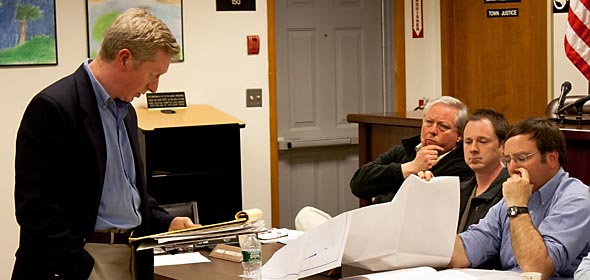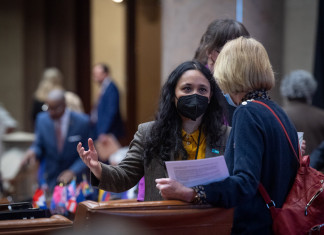
After a well-attended public hearing, the Red Hook Zoning Board of Appeals (ZBA) has agreed with applicant Patrick Sheehan and voted to allow used car dealerships and rental facilities in the town’s new Traditional Neighborhood Development Commercial Center (TND-CC) along Route 9.
In effect, the April 11 ruling means the first challenge to Red Hook’s new zoning regulations, commonly called Centers and Greenspaces, was successful.
In actuality, the ZBA, by a vote of 5-1, overturned Zoning Enforcement Officer Robert Fennell decision to deny Sheehan’s application for a used car dealership and rental facility at 7311 South Broadway, which is in the TND zone.
The TND residential and commercial center zones were created last year by the Town Board in a 4-1 bi-partisan decision. According to members of the Intermunicipal Task Force, which authored the zoning, the intent of the new regulations was to discourage sprawling commercial operations in that commercial center in favor of creating or maintaining a small-village aesthetic similar to downtown Red Hook, Tivoli and Rhinebeck.
In his denial of Sheehan’s application, Fennell had cited the zoning code’s section that states: “Vehicular-oriented commercial land uses and drive-through businesses would have a disruptive effect on the pedestrian orientation of the district and are therefore prohibited.”
However, Sheehan told the ZBA that a dealership and rental facility should not be considered a vehicular-oriented commercial land use because it would not have a high volume of daily customers and therefore would not disrupt pedestrians on the sidewalk.
He claimed that other municipalities’ definition of vehicular-oriented land uses usually involves a large number of cars coming and going from automatic carwashes, drive-through fast food restaurants and gas stations, for example.
His business, he said, should be considered a normal retail operation under the new code, which outlines the intention of the zone as “primarily to meet the day-to-day retail and service needs of the immediate neighborhood.”
Fennell cautioned the board not to establish an overly broad interpretation of a retail business. He cited town code that states a business can be considered retail if it “sells or rents items in small quantities for household consumption.”
And he pointed out that “automobile sales and rental establishments are [explicitly] allowed in the Town of Red Hook in the B1 and B2 business districts, but not in the TND-CC.” [ The B1 business zone is in Upper Red Hook along Route 9 and the B2 zone is the area around Firehouse Lane; neither currently has car sales or rental businesses.]
When the debate was opened for public comment, several members of the community offered a variety of opinions. Many residents expressed their support for new businesses in general or Sheehan’s plan in particular but did not weigh in on the issue at hand: the meaning and intent of the zoning law itself. Even if this broad request had been denied, Sheehan could have still requested a use variance for just his business without affecting the zoning rules in general.
Rosemarie Zengen, who lives directly across the street from the proposed business, addressed the intent of the zoning code saying that “this utopian traditional neighborhood, where people walk from the center of the village all the way out here, might work in Brooklyn or SoHo but I don’t think it is going to work here, and I think these business people should be encouraged to come to our town.”
Christopher Klose, chairman of the Economic Development Committee, reminded the ZBA that its decision could set a precedent that would affect development in the town in a very meaningful way.
Klose agreed that it was important for the town to attract new businesses, but cautioned that people have to work together in order to create the sort of development that will remain beneficial and sustainable in the long term.
“If we want the town, from the village down to Hannaford, to start to look more like Rhinebeck and less like Hyde Park — and I know some people say it looks like Hyde Park already — then we have to make these decisions with the future in mind and not just our current situation,” he said.
Tom Powers, owner of the NAPA auto store, said that Sheehan was not the first person to contact him about renting part of the property.
“At least 11 or 12 other people had approached me about the space but I turned them all down because thought it would be detrimental to the community,” he said. “I thought a small retail sale lot would be better for the community than another repair shop” because the traffic and potential danger to pedestrians would be lower with a car lot than a repair shop.
Wayne Graff, an attorney with offices in Kingston, argued that the zoning law leaves a great deal of room for interpretation. “The zoning law talks about retail uses being permitted, it does not say which retail uses. It does not say you can sell books and tomatoes but you can’t sell lingerie. You can obviously sell car parts, why can’t you sell the whole car?” he asked.
Ultimately, the decision hinged on the ZBA members’ interpretation of the intention behind the new TND zoning, as well as their understanding of the specifics in the law.
John Douglas, who chaired the meeting in the absence of Nick Annas, said, “Retail businesses are allowed. Mr. Sheehan wants to sell cars. That’s in the context of retail business in my mind. You have to pay sales tax. It’s like I’m going in to buy a suit. It’s retail, and I don’t see how you can say it’s not.”
Paul Marienthal, who was the lone dissenting vote on the board, disagreed. “It is clear in the intent of the zoning and planning process that has gone on here, that they don’t want a car lot down here, and I can see no way in the language of the law here that I could say, ‘Well, this just looks like a retail business to me’,” he said.
The wording in the final motion that passed said, “The board has determined that the rental and sale of used cars is permitted in the TND-CC.”
However, the board chose not to write a finding statement, which would have officially outlined the reason for the decision. So some ambiguity in the law remains. Vehicular-oriented land use was not specifically defined, nor was it officially established exactly what could be called a retail business in the context of the TND-CC zone.
The next step for Sheehan would be to resubmit his application for his used car business, which would now have to be accepted by the ZEO and then head to the planning board to seek further approvals if necessary.







Facebook Comments